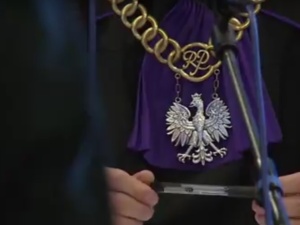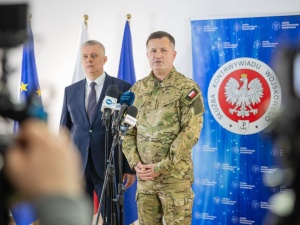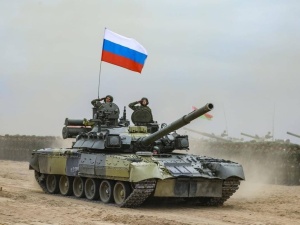Icchak Kacenelson: "Rękoma Żydów zadano śmierć Żydom"/"Through Jewish hands the death came upon the Jews"

W chińskiej księdze Zuozhuan jest takie podanie „Pewien człowiek o nazwisku Pi prosił o spotkanie z Księciem Wen, władcą państwa Jin. Władca nakazał go nie wpuszczać, zbesztać i przekazać mu, co następuje: ‚Podczas bitwy pod Pucheng twój Pan nakazał Ci przybyć (mnie zabić) dopiero następnego dnia, ty jednak przybyłeś od razu. Potem, gdy ścigałem Pana Huo na polach rzeki Wei, twój władca, Książę Hui rozkazał ci mnie zabić po upływie trzech dni, ty jednak przybyłeś już drugiego dnia. Chociaż prawdą jest, że musiałeś wykonać rozkazy władcy, to czemu jednak się tak w tym śpieszyłeś?”
Problem etyczny istoty kolaboracji władz ghett żydowskich z niemieckim okupantem nie tyle polega na samym fakcie tej kolaboracji, albowiem, jak twierdzą dziś ich żydowscy apologeci, działali oni po przymusem śmierci, lecz na tym, dlaczego, podobnie jak poeta Pi powyżej, byli w tym działaniu tak nadgorliwi...
Poniżej wiersz żydowskiego poety, które o tej nadgorliwości zaświadcza:
Jam jest ten, który to widział, który przyglądał się z bliska,
Jak dzieci, żony i mężów, i starców mych siwogłowych
Niby kamienie i szczapy na wozy oprawca ciskał
I bił bez cienia litości, lżył nieludzkimi słowy.
Patrzyłem na to zza okna, widziałem morderców bandy –
O, Boże, widziałem bijących i bitych, co na śmierć idą…
I ręce załamywałem ze wstydu… wstydu i hańby –
Rękoma Żydów zadano śmierć Żydom – bezbronnym Żydom!
Zdrajcy, co w lśniących cholewach biegli po pustej ulicy
Jak ze swastyką na czapkach – z tarczą Dawida, szli wściekli
Z gębą, co słowa im obce kaleczy, butni i dzicy,
Co nas zrzucali ze schodów, którzy nas z domów wywlekli.
Co wyrywali drzwi z futryn, gwałtem wdzierali się, łotrzy,
Z pałką wzniesioną do ciosu – do domów przejętych trwogą.
Bili nas, gnali starców, pędzili naszych najmłodszych
Gdzieś na struchlałe ulice. I prosto w twarz pluli Bogu.
Odnajdywali nas w szafach i wyciągali spod łóżek,
I klęli: „Ruszać, do diabła, na umschlag, tam miejsce wasze!”
Wszystkich nas z mieszkań wywlekli, potem szperali w nich dłużej,
By wziąć ostatnie ubranie, kawałek chleba i kaszę.
A na ulicy – oszaleć! Popatrz i ścierpnij, bo oto
Martwa ulica, a jednym krzykiem się stała i grozą –
Od krańca po kraniec pusta, a pełna, jak nigdy dotąd –
Wozy! I od rozpaczy, od krzyku ciężko jest wozom…
W nich Żydzi! Włosy rwą z głowy i załamują ręce.
Niektórzy milczą – ich cisza jeszcze głośniejszym jest krzykiem.
Patrzą… Ich wzrok… Czy to jawa? Może zły sen i nic więcej?
Przy nich żydowska policja – zbiry okrutne i dzikie!
A z boku – Niemiec z uśmiechem lekkim spogląda na nich,
Niemiec przystanął z daleka i patrzy – on się nie wtrąca,
On moim Żydom zadaje śmierć żydowskimi rękami!
Icchak Kacenelson, Pieśń o zamordowanym żydowskim narodzie, Warszawa 1982, s. 23.
--------------------
Those who don't speak Polish, I am giving below my opinion on the issue of the Jewish collaboration with the Nazis, and refer the readers to the best source to check how it was viewed by the Jewish victims themselves. I agree with Dr. Kurek, the Polish historian, that the voices of the Jewish victims who witnessed their own death, speak the ultimate truth on the matter, sad as the truth might be.
Strangely enought, although the author of the poem attached hereunder , himself a victim to the German invented and executed holocaust, is a very respected and admired Polish Jewish poet and intellectual, the attached fragment of his poem is missing from the depths of internet and it is not included among other English version selections from this long work. So I did some translation as to share with everybody in the social media what Itzak Katzenelson indeed had to say on that matter.
So there goes first my opinion:
The Chinese classic „Zuozhuan” contains the following story: „ A man named Pi asked to see Duke Wen, the ruler of Jin. The ruler refused to see him, ordering his servants to repremand him and pass to him the following message: „During the Battle at Puchang, your lord gave you an order to leave on the next day to kill me. Yet, you left immediately. Later, while I was chasing Lord Huo on the territories along Wei River, your Lord, Duke Hui, ordered you to kill me on the third day. Yet you arrived already on the second. Although it is true that you had to execute your lord’s orders, still why was it that you were so much in a hurry?”
The ethical problem posed by the true nature of the collaboration by the ghetto authorities with the German occupier lies not so much in the fact of this collaboration as such, for as their apologists argue at present, they – the authorities – did it out of fear for their lives, but in the fact that just like the man Pi in the anecdote cited above, they were overzelous in doing it.
This exerpt best serves as a testimony to this excessive zeal:
I am the one who saw it all up close,
Children, wives and husbands, and these hoary-headed old men of mine
Like stones and slivers tossed on carts by an executioner
who flogged them without a shade of pity, abused them with inhumane words.
I looked at all this through the window, and saw bands of killers –
Oh God, I saw those who were beating and the beaten marching to their death...
I wrought my hands in shame… shame and disgrace –
Through Jewish hands the death came upon the Jews – the defenseless Jews!
Traitors, those in shining bootlegs who ran in empty streets
Like with a swastica on their caps – with David’s shield they marched full of ire
With their mouths that wounded those words foreign to them, arrogant and ferocious,
Who threw us down the stairs and dragged us from our homes.
Who tore doors open only to burst in with violence, those bastards,
With a club raised high and ready to hit – into the homes overwhelmed with terror.
They pounded on us, hustling the elders and shoving our youngest
Somewhere into the streets overflowing with fear. And they spat straight into God’s face.
They found us in the closets and pulled us from under the beds,
And foul-mouthedly yelled: „Press on, to Hell, to umschlag, where it is that you belong”
They dragged us all from our homes, only to hunt in them a bit longer,
To take the last piece of cloth, a bite of bread and groats.
And once in the street – they went mad! Look and cringe, for
this dead street came to be a single cry of terror –
From one end to another so empty and yet full as never before –
Lorries! Heavy with so much despair and screaming...
Inside of them sit the Jews! Pulling their hair and wringing their hands.
Some remain silent – their silence screams even louder.
They stare… their gaze… is it for real? Or maybe it’s no more but a horrible dream?
Next to them are standing the Jewish police – atrocious and savage scoundrels!
Nearby – a German with a slight smile keeps an eye on them,
The German stands at a distance and observes – he doesn’t need to meddle in,
For he kills my Jews with the Jewish hands!
Icchak Kacenelson, The Song of the murdered Jewish People, Czytelnik, Warsaw 1982, page 23
Agnieszka Couderq














